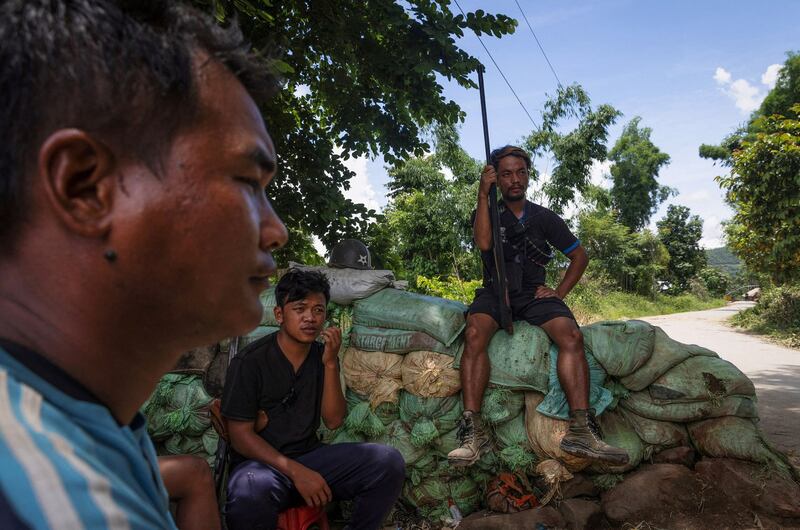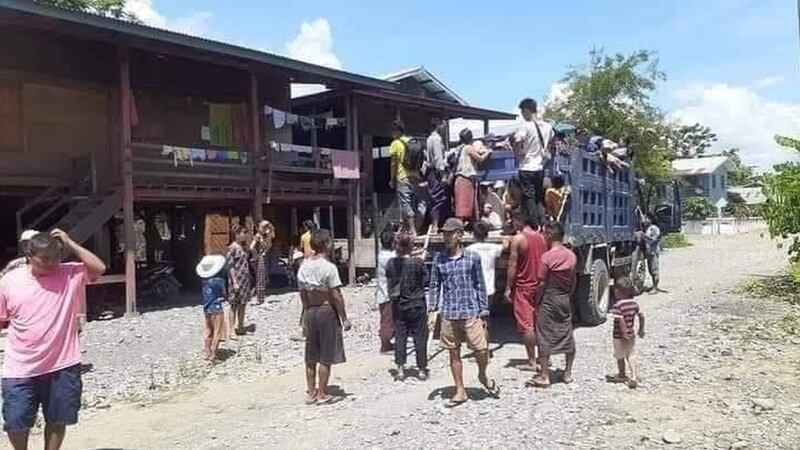Authorities in the Indian border state of Manipur have begun collecting biometric data from thousands of Myanmar citizens who have fled conflict between armed ethnic groups and the military junta in their home country, but the refugees fear that the collected data could be shared with the junta, several refugees told Radio Free Asia.
Since fighting broke out on July 22 in the town of Khampat on the Myanmar side of the border, more than a thousand local residents have fled to Manipur. They have not been able to return since.
They are among about 50,000 Myanmar citizens who have fled to India since the junta ousted Myanmar’s democratically elected government in a coup in 2021. The Indian government has been collecting biometric data since the end of July.
The refugees, aid workers and human rights activists are concerned that India will arrest Myanmar citizens using the collected biometric information and hand them over to the military junta or that they could be swept up into internal conflicts in India.
Refugees from Myanmar are required to record their fingerprints, eyes, face, and voice, a Myanmar refugee, who requested anonymity for security reasons, told RFA’s Burmese Service.
“They register by scanning the eyes and all 10 fingerprints. The data has been collected as if we are migrants from another country,” the refugee said. “The first place the biometric data was collected was in the detention center.”
The refugee said that all of the refugees in the center will be registered within the next three to four days.
“All of us outside the center will have to register ourselves as migrants in police stations as migrants, and we will have to provide our biometric data to do so.”
Another refugee said many feel unsafe because they are worried that the biometric data could be used against them. Additionally, they fear that the government is increasing security measures because the refugees could be swept up in a local ethnic conflict.

“In the conflict between the Meitei and Kuki, two local Indian ethnic groups, … the Kuki tribe is protecting the Myanmar refugees. So in return the refugees seem to support the Kuki,” the second refugee said. “Indian authorities might have concerns that the refugees might be involved or complicit in the conflict which could lead to our mistreatment at the local level as well.”
According to a statement of the Manipur state government on July 29, the biometric data collection process started in the foreigner detention center near the Sajiwa prison in East Imphal District.
Indian media outlets reported that the Indian Ministry of Home Affairs, Manipur and Mizoram state officials discussed the issue of registering Myanmar refugees in April 2023 and decided to start the process in Manipur state. Current directives from the ministry authorize biometric data collection in Manipur starting on July 29 and ending on Sept. 30.
Concerns
The biometric data could enable the selective arrest of any refugee who is wanted by Myanmar’s junta, Salai Dohka, an official for an India-based organization called India for Myanmar, told RFA.
“Myanmar political activists who [the junta] regard as criminals … who are sheltering in India could be sent back to Myanmar in some form of criminal exchange,” said Dohka. “We are also worried that Myanmar refugees in India could be accused of committing drug and other unlawful crimes and could be used as scapegoats in ethnic disputes caused by political conflicts in India.”

Salai Tel Ra, the program manager of Chin Human Rights Organization, told RFA that the collection of biometric data should not be done and that there is a rising concern about how this information will be used.
“This information is related to the rights of each citizen and their survival and security,” said Ra. “They should not force the refugees to give up their biometric data. It would be another story if the stakeholders voluntarily consent to it. In fact, [the refugees’ data] is none of the Indian government’s business.”
RFA attempted to contact both the Indian Embassy in Yangon and the Indian Foreign Ministry in New Delhi for comment on the situation, but neither has responded. Officials of the East Imphal District in Manipur state were also not responsive to questions.
The Myanmar Embassy in New Delhi did not reply to emails asking if they would protect the refugees.
The junta’s spokesperson in the Sagaing region did not respond to telephone calls.
Translated by Myo Min Aung. Edited by Eugene Whong.

